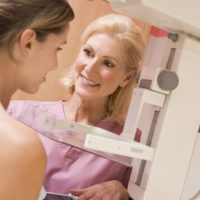If you have breast implants, make sure you still get regularly screened for cancer. Not only is breast cancer very common, but some implants have been linked to cancer as well. See how you can get a proper screening for breast cancer with implants and reduce your risk of breast implant cancer.
Tips for Cancer Screening With Breast Implants
If you are getting a breast cancer screening with implants, doctors may have trouble seeing cancerous masses on imaging scans. Breast implants consist of either saline or silicone, and these materials can block parts of the breast from X-rays.
Some medical facilities also may not know how to properly scan for cancer in patients with implants. Fortunately, there are ways you can get a successful cancer screening.
Good practices to follow for breast cancer screening with implants include:
- Know Before You Go: Learn if the screening center has handled other clients with breast implants. This can help reduce the risk of issues due to lack of experience.
- Tell Staff Members: Make sure to tell the staff if you have breast implants before the scans are done so they can properly prepare.
- Get Extra Scans: See if you can get extra imaging scans done during a mammogram. These scans can help doctors get a more comprehensive view and catch cancer, even if you have implants. Doctors may even recommend that you get additional scans due to the implants.
- Get a 3D Mammogram: See if a 3D mammogram is available, as this increases the odds that doctors will be able to see any cancer tumors.
- Always Get Checked: Some lumps may be associated with the implant, and not related to cancer. Make sure to get them checked anyway. You don’t want to risk developing cancer.
Can Breast Cancer Screening Affect My Implants?
In very rare cases, breast implants can be damaged or ruptured during the screening process. This is generally associated with compression from a mammogram, but it can also happen during another procedure known as a needle biopsy.
Needle biopsies may be done if normal imaging scans are inconclusive. Doctors insert a needle to collect a fluid or tissue sample from a lump in the breast. They then study it under a microscope to see if cancer cells are present. In rare instances, needle biopsies may cause implant rupturing, depending on where the lump is located.
If you are worried about a possible implant rupture, check with your doctor before undergoing a mammogram or needle biopsy. If your doctor says you might be at risk, then you may want to consider an MRI instead of having a mammogram.
Other Risks of Breast Implants
It’s very important to still get screened for cancer if you have breast implants — especially since some implants can actually cause cancer or other illnesses. Learn more below.
Breast Implant Cancer
Breast implant cancer can develop in scar tissue around an implant or the fluid between the scar tissue and implant. It is also known as breast implant-associated anaplastic large cell lymphoma (BIA-ALCL). Both silicone and saline breast implants may cause this cancer.
Most cases of breast implant cancer are reported in women with textured breast implants. Allergan, Mentor, and Sientra breast implants have all been linked to BIA-ALCL.
While breast implant cancer is highly treatable, 36 women have died from this cancer as of 2020, according to the Food and Drug Administration (FDA).
If you believe you may be at risk, watch for possible symptoms and talk with a doctor to receive a full medical evaluation.
Symptoms of breast implant cancer include:
- Lumps
- Pain
- Swelling of the breast, particularly near the implant
- Changes in breast size
- Redness
A mammogram or a needle biopsy are among the testing procedures used to diagnose breast implant cancer.
Breast Implant Illness
Breast implant illness is caused by an autoimmune reaction to the implants. Any type of implant can cause breast implant illness.
Breast implant illness symptoms include:
- Fatigue
- Muscular or joint pain
- Anxiety or depression
- Rashes
- Headaches
- Hair loss
- Sleep issues
- Memory or concentration issues
These symptoms can begin immediately or start years after the surgery. In some patients, the symptoms resolve themselves over time. But in extreme cases, removal of the implants may be necessary to alleviate symptoms.
Next Steps for Women With Breast Implants
It is important for women undergoing breast cancer screening with implants to stay safe. If you are going to a cancer screening, remember to tell your doctor about your implants ahead of time to avoid complications.
Another important tip is to note any strange lumps or masses, changes in the implants, or symptoms of breast implant cancer. See a doctor if any of those issues appear.
Finally, if you develop breast implant cancer, you may be able to access compensation. Get a free legal case review to learn more.
